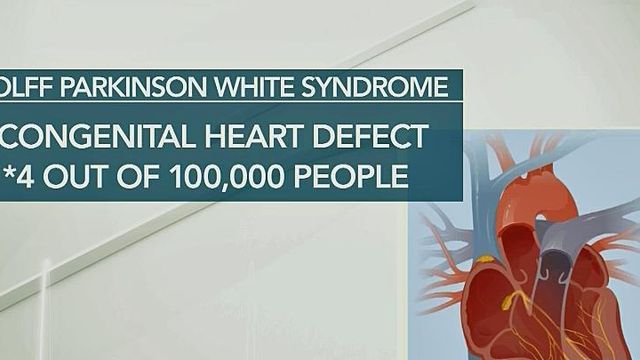Holly Springs family finds 'Heart Hero' in 5-year-old daughter
Congenital heart defects are often discovered before birth or during infancy. Others can be harder to detect and, if left untreated, can lead to life-threatening episodes.
Posted — UpdatedFive-year-old Lilah Rogers and her Holly Springs family learned that in June.
"She fainted on her bedroom floor and was unresponsive for a few seconds," said Lilah's mother, Kelly Rogers. "She perked up a few seconds later, (but) was a little bit sluggish. Within 30 minutes later, she was up, wanting to play, eating breakfast."
Still, her parents took her to WakeMed Children's Emergency Department to find out what happened. Doctors checked the electrical activity of her heart.
"They came back in and said, 'Have you ever heard of Wolff Parkinson White Syndrome?'" Rogers said.
The rare congenital heart defect, which affects four out of 100,000 people of all ages, involves an extra electrical pathway between the heart's upper and lower chambers that can cause a rapid heart beat, called tachycardia.
"We were, 'OK, we have to take care of this immediately,'" said Lilah's father, Jake Rogers.
Repairing the condition used to require heart surgery, but it now can be done by running a wire catheter through a leg artery to the heart.
At Duke University Hospital, cardiologists found the errant pathway and used the catheter tip to disrupt the problem in the heart tissue. After the six-hour surgery, Lilah recovery quickly.
"Seven days after her surgery was her very first day of kindergarten," Kelly Rogers said.
"She was able to start with no limitations," Jake Rogers said.
Kelly Rogers works for the American Heart Association and is in contact with many heart disease survivors, or "Heart Heroes" as they are called.
"We didn't even know the last six years we had our own story and our own "Heart Hero" right here," she said.
• Credits
Copyright 2024 by Capitol Broadcasting Company. All rights reserved. This material may not be published, broadcast, rewritten or redistributed.





